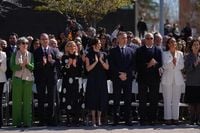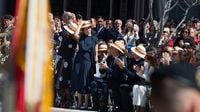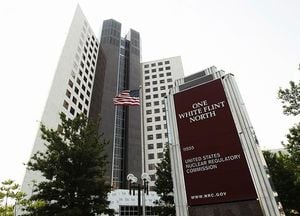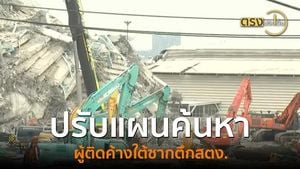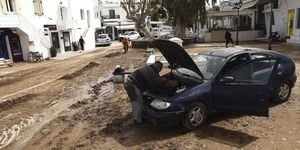On Saturday, March 29, 2025, Isabel Díaz Ayuso, the President of the Community of Madrid, attended a civil flag swearing ceremony in Alcobendas. This event was marked by controversy, as Ayuso had previously clashed with the central government regarding her role in the ceremony. The Ministry of Defense had warned that the event would be canceled if she presided over it, leading to significant tensions between her administration and the national government.
Despite these challenges, Ayuso participated as a guest, positioned away from the main authorities, which included the socialist mayor of Alcobendas, Rocío García Alcántara. After the ceremony, Ayuso took to social media to express her sentiments, stating, "Swearing allegiance to the flag is a solemn act in which loyalty to Spain is promised." She described the day as a beautiful and unforgettable experience, emphasizing her honor in being present with the residents of Alcobendas, where she had sworn allegiance to the flag years earlier.
Ayuso's attendance was not without its difficulties. In her remarks to the media, she lamented what she considered an unprecedented treatment from the Ministry of Defense, which attempted to prevent her from attending the ceremony. "When they learned of my intention to come, they threatened to cancel the parade outright," she explained, highlighting the unusual nature of the situation. "This has never happened in history," she asserted.
During the event, a total of 205 civilians swore allegiance to the flag, an act presided over by General Antonio R. Bernal Martín, head of the 'Guadarrama' XII Brigade. The ceremony took place in the Plaza Mayor of Alcobendas and was attended by various local dignitaries. The event included a floral offering by the oldest and youngest participants, aged 92 and 18, respectively, in tribute to those who sacrificed their lives for the nation.
Ayuso has been vocal about her concerns regarding the separation between the Armed Forces and the people of Madrid, criticizing the government's decision to cancel the traditional military parade scheduled for May 2, 2025. She argued that this separation is unjustified and detrimental to the citizens of Madrid. "The message that the Army belongs to a government or a president is very concerning," she stated, expressing hope that the Ministry of Defense would reconsider its decision.
The tensions between Ayuso's administration and the central government have been escalating, particularly following the government's order to prevent the Army from participating in the May 2 parade. This directive, Ayuso believes, reflects a political vendetta rather than a legitimate logistical concern. She emphasized that the citizens of Madrid deserve to see their Armed Forces in the parade, a sentiment echoed by many attendees at the ceremony.
In light of the ongoing disputes, the Community of Madrid has decided not to invite any members of the central government to the May 2 event. Ayuso's administration has accused the national government of breaking all institutional relations with the region, further complicating the political landscape in Madrid.
The ceremony in Alcobendas not only served as a platform for Ayuso to assert her presence and commitment to the community but also highlighted the growing divide between regional and national authorities. As the political battle continues, Ayuso is determined to maintain her connection with the citizens, stating, "What matters is being with the residents, regardless of my role in the ceremony. I believe it is essential to be there for them, and that is the affection they have shown me. They appreciate my presence here today."
As the situation evolves, Ayuso remains hopeful that dialogue can bridge the gap between her administration and the national government. She expressed her desire for a resolution that would allow the May 2 parade to proceed without political interference, underscoring the importance of the Armed Forces to the identity and pride of Madrid's citizens.
In the days leading up to the ceremony, there were reports of tense negotiations between Ayuso's office and the Ministry of Defense, with attempts to modify the protocol to exclude her from any significant role. Ayuso criticized these efforts, stating that it is customary for the president of the community to preside or co-preside over such events.
The ceremony itself was a significant occasion for the community, as it reaffirmed the bond between civilians and the military, a relationship that Ayuso believes is crucial for the identity of Madrid. She noted that the event reflects the commitment of the Armed Forces to society and the interest of citizens in reaffirming their connection to Spain.
As the political climate remains charged, with shouts of "Sánchez resign!" and "Ayuso, traitor!" echoing from some attendees, the implications of this event extend beyond mere ceremonial duties. It serves as a reminder of the ongoing tensions in Spanish politics, where local and national interests often collide.
Looking ahead, Ayuso's administration is already exploring alternatives for the May 2 event, considering a scenario that emphasizes local emergency services and community organizations in the absence of the military. This shift could redefine how the Day of the Community of Madrid is celebrated, reflecting a commitment to local values amidst the backdrop of national political strife.
In conclusion, the civil flag swearing ceremony in Alcobendas not only marked a significant event for the participants but also underscored the ongoing political battles between the Community of Madrid and the central government. As Ayuso navigates these challenges, her focus remains on the citizens of Madrid and their connection to their Armed Forces, a bond she believes must be preserved and celebrated.


